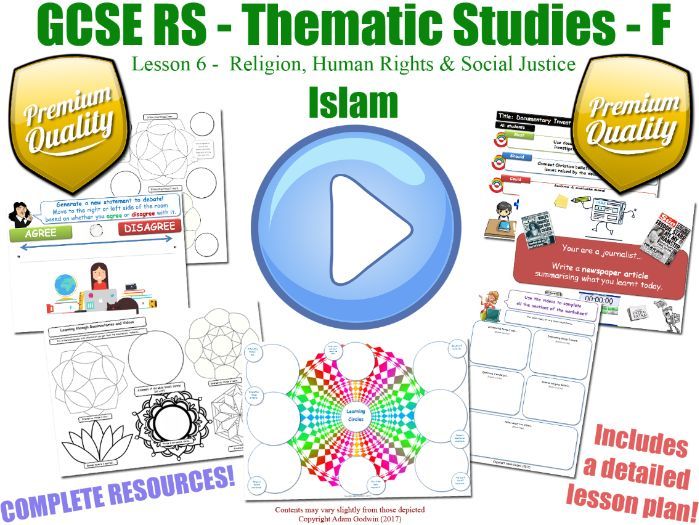Religion, Philosophy, Sociology & Ethics Resource Base
Resources for Religious Studies, Sociology, Philosophy, Ethics and Humanities. We specialise in making whole units and courses for ultimate convenience and time-saving. We always aim to make the best resource for a given topic: our goal is perfection and our resources have helped educate 1 million+ students! In order to encourage ratings and reviews, if you buy any of our products, are happy with your purchase, and leave a 5* rating for it: just email us and we'll send you a free bonus gift!





![Key-Word Lists [ AQA GCSE Sociology - 8192] Education, Families, Crime & Deviance, Social Strafic...](https://dryuc24b85zbr.cloudfront.net/tes/resources/11537008/image?width=500&height=500&version=1519314159429)







![Sex Before Marriage - Buddhism & Christianity (GCSE Lesson Pack) [Religious Studies] [Premarital Sex]](https://d1e4pidl3fu268.cloudfront.net/20c2a4cf-37b5-49a2-b6b5-f34ab2ed84f4/BuddhismSexBeforeMarriagePremarital.crop_957x720_0,0.preview.jpg)
![Animal Experimentation - Buddhism & Christianity (GCSE Lesson Pack) [Religious Studies] [Animal Testing / Research]](https://d1e4pidl3fu268.cloudfront.net/f231c24c-b819-4a1d-a1fc-ba1451167554/BuddhismAnimalTestinResearchExperimentation.crop_957x720_0,0.preview.jpg)
![Contraception - Islam & Christianity (GCSE Lesson Pack) (Muslim / Islamic & Christian Views) [Religious Studies]](https://d1e4pidl3fu268.cloudfront.net/c688e7fd-c2b9-4c17-9196-d4dd4b687820/IslamContraceptionGCSELessonResourceTeachingPack.crop_957x720_0,0.preview.jpg)
![Homosexual Relationships - Islam & Christianity (GCSE Lesson Pack) (Muslim / Islamic & Christian Views) [Religious Studies] [Homosexuality]](https://d1e4pidl3fu268.cloudfront.net/63da5370-a179-4e49-aa56-5d1e8b6f4b35/IslamHomosexualRelationshipsHomosexualityGCSELessonResourceTeachingPack.crop_957x720_0,0.preview.jpg)
![Freedom of Religious Expression - Islam & Christianity (GCSE Lesson Pack) (Muslim / Islamic & Christian Views) [Religious Studies]](https://d1e4pidl3fu268.cloudfront.net/055e0c00-9f9c-486d-b1cb-1f22791d4ebf/IslamFreedomofReligiousExpressionGCSELessonResourceTeachingPack.crop_957x720_0,0.preview.jpg)



![P4C Christianity [x4 Resource Value Bundle] (P4C, Philosophy, RE, RS, P4C, Christianity, ethics, belief, religion, religious, religious studies, religious education, Christian, Tutor, Form, PSHE]](https://d1e4pidl3fu268.cloudfront.net/32388377-92db-4b42-b1fb-70a1539caeb2/ChristianityChristianRERSReligiousEducationReligionStudiesUKGCSEKS3KS4Cover.crop_959x720_0,0.preview.jpg)